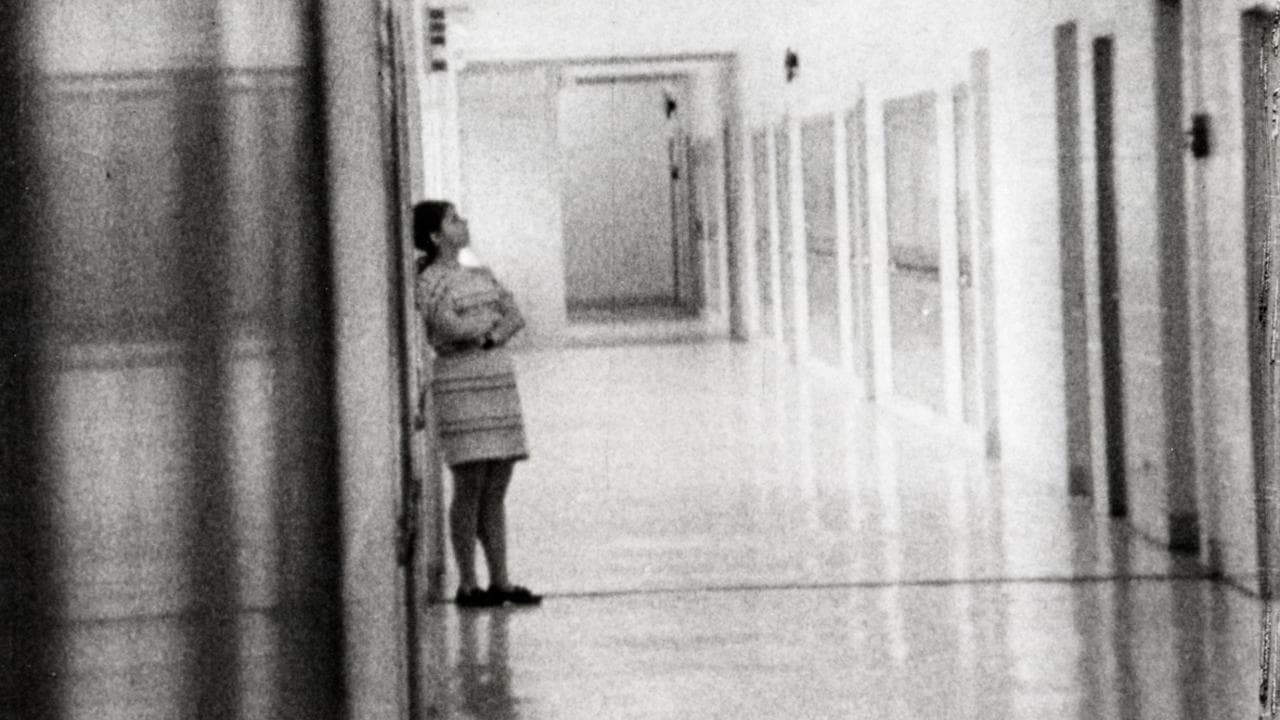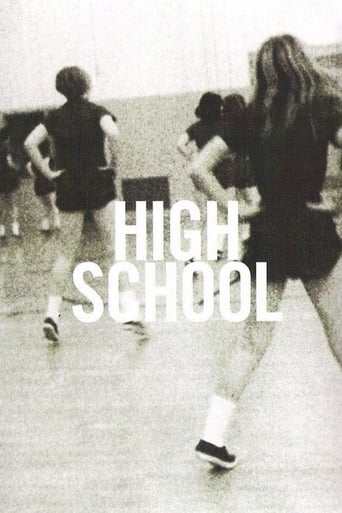



Most undeservingly overhyped movie of all time??
Don't listen to the negative reviews
This is one of the best movies I’ve seen in a very long time. You have to go and see this on the big screen.
View MoreThis is a dark and sometimes deeply uncomfortable drama
View MoreAs in TITICUT FOLLIES, Wiseman takes his camera inside an institution and exposes the authoritarianism that dominates the place. However, I have to say I was less disturbed by what I saw here. There are some clear instances of backwards attitudes: the notably different tones of the female and male sex ed lectures, what is apparently a fashion class where the teacher casually remarks of the students' physical shortcomings, and the chillingly obtuse reading of a letter from a student serving in Vietnam. But other clips that seemed designed to point out some sort of injustice or dehumanization didn't strike me as terribly egregious. Are we supposed to judge the English teacher as ridiculous for attempting to teach poetry with a Simon & Garfunkel song? When a kid says he doesn't deserve detention, are you just supposed to say "Oh, sorry about that" and let them skip it? Maybe some of the figures are a little out of touch and some are a little bit drunk on power, but I really didn't see a whole lot to make me think the school was a fascist nightmare or anything. Still, perhaps the attitudes speak louder than the actual actions, and there is a sense of isolation from the real world. And regardless of whatever messages Wiseman is trying to get across, it's a compelling look at a specific time and place.
View MoreWell, I attended Northeast while Wiseman and crew were filming the movie. Twenty years later, I finally located a copy in the Indiana University libraries and watched it.I can tell you that he did NOT capture the essence of our high school, due mostly to the disruption caused by the camera crew. I received a better education than anyone else I met in college. Since I double-majored in Electrical Engineering and Humanities at Notre Dame, I was grateful for the college-prep curriculum I had received at NE. My high school Chemistry, Physics, Calculus, History, English and Latin classes left me well-prepared for college.Like the Heisenberg Uncertainty Principle in Physics, where observing a subatomic particle changes its nature, the presence of the camera crew changes what happens in each venue. For example, there's a scene where an English teacher (Mrs. London) plays records all period because the camera's presence prevented students from paying attention to the scheduled lesson. Wiseman made it seem like "Here's what kids are learning all day long."Coincidentally, I lived in Panama for three years. Wiseman's 1977 movie "Canal Zone", about the Panama Canal, presented a similarly incorrect view. Cinema Verite - - at least Frederick Wiseman's version - - is not worth the publicity it receives.
View MoreI love this film. It really makes you think about how high schoolers are oppressed. I love the style of this film because it has no narrative, just shots from a high school. There is no one telling you what to think or what is going on. Therefore you are forced to think for yourself about what is going on. It is very interesting to hear the reactions of teachers and students after viewing this film, as they have different interpretations.There are a few scenes that really stand out to me. The main one being the last scene. The woman who reads the letter from the ex-student who is now in Vietnam stressed how "successful" this school has been in creating such a great student. The former student had written her a letter thatn basically stated that he no longer thinks of himself as a person, but as a body. He is humbled by his country and he will blindly obey his orders in the service. He wants his insurance money to go to the school if he gets killed in combat. It is the least he do for a school that taught him such strict discipline - so much discipline that he no longer thinks of himself as a human being with feelings!! That is what I got out of it, at least. It's a great punchline.I would also like to comment on the closeups of the girls butts in the gym. I did not interpret this as some sexist filmmakers getting their kicks by watching the girls jump around in short shorts. I thought it was more of an ironic connection between the girl that was reprimanded at the prom for having such a short skirt. It was also a connection between the fashion show and the teacher who was trying to teach girls how to be ladylike in a very blunt and insulting manner. The school is forcing the girls to wear these ridiculous gym outfits that have very short shorts. Then they force the girls to play ridiculous games and do stupid excersizes. I think it shows how sexist the high school was, rather than the filmmakers. It made the girls all look like objects, which is exactly what the high school was practicing.I thought it was really great how Wiseman included the entire reading of Casey at The Bat. The viewer most likely does not want to hear the teacher read this whole thing, yet we are forced to hear the whole poem read, quite dully. This shows how DULL and dehumanizing high school can be. The viewers are feeling exactly the same feelings the students must have been feeling at the time. We don't want to hear the poem, neither do the students. Yet this is the beauty and absurdity of these high school rituals. I also liked the Spanish class in which the students are repeating the Spanish word for existentialism, and other philosophies. It is very ironic that the students are in this oppressive institution and brainlessly being forced to repeat these philosophies that preach the exact opposite.The girl who gets defenisve about being too individualistic is also ironic. She swears her short skirt was not trying to make her "an individual", as if that was a bad thing. It is so interesting to see how different the generational views are. One student is claiming he is "being a man" by standing up for what he believes in when being wrongly accused of acting up in class, while the vice principal says in order for him to "be a man" he must follow orders and swallow his pride. Such different views about manliness!I could go on and on, but I will not. This is a great film. High schoolers today should watch this film, as well as "No Reason to Stay", another anti-high school film from the 60's. It will re-enforce their gut feelings that high school really does suck.
View MoreSometimes the best films are those truest to themselves. There's nothing phony about this movie. It's a time capsule. It captured a cloistered, closed system from within. The results are spellbinding.The faculty of NorthEast high school in Philadelphia are the stars. The viewer decides whether their actions are good or bad. There's certain purity at work. Is it an imperfect system? You bet it is. Do rules appear petty and draconian? Yes, they do. But there is hope inside the bubble. The faculty at NorthEast could be teachers at my high school. We have the flat-topped disciplinarian, the hip, young English teacher, the no-nonsense fashion matron, and the boring instructor with the bad teeth.The scene with the coach and the graduate who visited while on leave from Vietnam illustrated one of the prominent themes; this environment is in a bubble insulated from community and society. In this scene, the coach made a connection between a soldier's war wound and the effect on his sports career. He was so wrapped up in his role as the school coach; he immediately applied news from the outside world to his microcosmic world inside the school grounds.This theme was also reiterated by a boy in one of the rare scenes where students were the stars. The would-be bohemian said as much; this school is a cloistered, closed system. The bubble theme is further underscored by the sequence where three boys emerged from a space capsule simulator after 193 hours. There was much fanfare for the successful end to 'Project SPARC' including a telegram from astronaut Gordon Cooper, read with typical dragnet-style inflection by the sponsoring teacher.In fact, several scenes feature extended recitations of written material by instructors who suffer from chronic educational ennui. There is the flat rendition of 'Casey at the Bat', the review of the typing test text, and the dreaded retelling of the "thought for the day" from the daily bulletin. A glimpse of self-awareness offered by a young English teacher was most startling. In the course of dissecting Paul Simon's poem "The Dangling Conversation", she read it aloud first, and followed with the Simon & Garfunkel song version. She told the students to listen to both versions. The poem came alive with the music. A lingering shot of the teacher showed the hope in her eyes that someone will get the message. For me, it's the best sequence in the film. If Wiseman wanted to underscore a failure of the system, it lied not with the disciplinarian tactics or heavy-handed advice dispensed by the staff, but with the inadequacy of the delivery methods used by educators.The message turns hopeful in the last scene. A teacher reads a letter at a faculty meeting written by the former student on station in Vietnam. Tight camera work reveals the emotion of the reader, in contrast to the non expressive faces of the previous speakers. The written word provides power after all. There's hope on the part of the student to survive outside the system, hope on the part of the administrator reading the note that they do have an impact on their charges, and hope that inside a flawed machine such as the educational system, someone gets the message.
View More